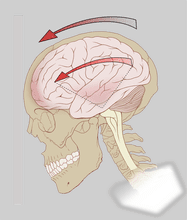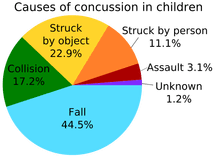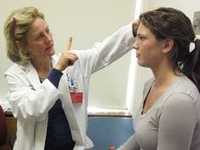 The concussion is an injury that is gaining more attention over the past few years, especially with the increase in exposure in the media. It is estimated that concussions account for 8.9% of all high school athletic injuries and about 7% of all sports-related injuries. However, it is likely that the total number of concussions estimated is low due to under-reporting of injuries as many athletes will not seek medical attention following a concussion. So you had an athlete get a hit to the head during practice. Maybe they were basing a stunt and the flyer came down on their head, or they were tumbling and collided with a teammate. What should you do? One thing about concussions is that not everyone presents the same way. There are many different possible symptoms that can be present, and any one person can have any possible combination of those symptoms.  Mechanism of Injury 2 most common mechanisms of injury (how the injury occurred)
A concussion is not a direct injury to the brain tissue itself, rather a chemical reaction and alterations that cause the symptoms that we typically see.  Common Symptoms The most common symptoms to look out for include the following:
If any of these symptoms are present following a blow to the head, it is crucial for the athlete to see a medical professional to be assessed for a concussion. It is imperative that an athlete that is displaying any signs or symptoms of a concussion to sit out for the remainder of the day until they are cleared by a medical professional. While it is very rare for someone to have every one of these symptoms, it is possible. A common misconception is that someone must lose consciousness for a concussion to take place. It is important to note that less than 10% of concussions are associated with a loss of consciousness. So even if the athlete did not get “knocked out”, they very well may still have a concussion.  Diagnosing a Concussion The diagnosis of a concussion is typically based on the signs and symptoms that are present, as it will not show up on any type of imaging. MRI and CT scans may be used to detect skull fractures or bleeding in the brain. Physical therapists and athletic trainers are trained in conducting several different tests that can be used to aid in the diagnosis of a concussion. Many programs and athletic associations have begun to implement baseline concussion testing. What this does is provides the information of an athlete's normal cognitive and physical functioning. So if there is a question of a possible concussion, the same test can be repeated to compare the athlete to their baseline. A concussion is classified as a mild traumatic brain injury and needs to be treated as such. Many times the symptoms of a concussion do not show up right away and can even take a few hours to a few days to present. This is why it is important to make sure that the athlete is examined by a healthcare professional if there is any suspicion of a possible concussion. This is Part I of a 3 part series, Click Here for Part 2
1 Comment
2/7/2023 09:25:57 am
Thanks for sharing the article, and more importantly, your personal experience of mindfully using our emotions as data about our inner state and knowing when it’s better to de-escalate by taking a time out are great tools. Appreciate you reading and sharing your story since I can certainly relate and I think others can to
Reply
Leave a Reply. |
Archives
April 2022
Categories
All
Disclaimer: The information contained on this website is compiled from a variety of professional sources as well as the author's own experiences. The information should NOT be used in place of a visit to your healthcare provider or used to disregard any advice provided by your healthcare provider.
|

 RSS Feed
RSS Feed